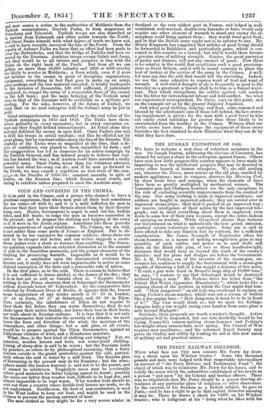COLD AND COVERING IN THE CRIMEA.
IT is so cold in the Crimea, said a person who claimed to have a practical experience, that when men pull off their boot sometimes the toe comes off with it; and it is a mild infliction for men to discover that they have their throats about them by their throats' being sore. Hence, Government is urged to send out fur, buffalo robes, and felt boots; to lodge the men in burrows excavated in the ground; and to prepare the clothing and lodging of the army as if it were in the Arctic regions. Assertions like these provoke counter-assertions of equal confidence. The Crimea, we are told, is not colder than some parts of France or England. Fur is ob- served to be too expensive for common soldiers; sheep-skins are said to be cheaper and better, and one writer suggests a caout- choue jacket over a cloak as warmer than anything. The frozen. toe question expands into an extended discussion as to the amount of cold in the Tauridian peninsula, and the proper character of the clothing for preserving warmth. Impossible as it would be to arrive at a conclusion upon the disconnected evidence thus thrown out, it really does not seem impracticable to arrive at some distinct conception of the facts and a reasonable rule of action. In the first place, as to the cold. There is reason to believe that it is not sufficient to freeze alcohol, or the flames of the fire ; that it is in fact not so cold as Canada often is. " Experto Crede," writing to the Times, observes that at Sebastopol the thermometer seldom descends below 20' Fahrenheit. By the comparative data collected by Professor Dove of Berlin, it appears that the lowest mean temperature of any winter month is 37' 35' in London, 353 44' in Paris, 34° 27' at Sebastopol, and 330 58' in Dijon. Now, certainly, the inhabitants of Dijon do not require to thaw their fire before they can warm themselves; they do not skate upon their native brandy, nor leave their toes in their boots, nor walk about in Russian costume. It is true that it is not only the thermometer that indicates the severity of a climate ; we must know the force and direction of the wind, the moisture of the atmosphere, and other things : but a safe plan, at all events, would be to prepare against the Dijon thermometer, against an Eddystone violence of wind, and a Manchester moisture.
What, then is the best kind of clothing and lodging ? Not, we conceive, wooden houses and huts, nor water-proof clothing. Lining of sheep-skin is said to be warm ; but the Russians learn by practice, as others do by philosophical reasoning, that a furry texture oureide is the grand protective against the cold, particu- larly where the cold is borne by a stiff wind. The Russian plan of burrowina in the ground may do for Russians ; but the atmo- sphereinside the human warrens is said not to be the purest, and it cannot be salubrious. Troglodyte caves may be serviceable where good materials for better lodging cannot be found ; possibly the eaves are better than wooden huts, difficult to be kept dry, and almost impossible to be kept warm. Why wooden huts should be sent out from a country where double-iron houses are made,. we do not understand. Double-iron, the best of non-conductors, is used in the West Indies to keep out heat, and might be used in the Crimea to prevent the passing ontward of heat.
The men clothed as they might be for a very severe winter in-
Scotland or the very coldest part in France, and lodged in well- ventilated, well-warmed, double-iron barracks or huts, would only require one other element of warmth to stand any enemy the at- mosphere could bring against them : they would want good food; and in that the British army ought not to be inferior to any. Mr. Henry Kingscote has suggested that articles of good living should be forwarded to Balaklava, and particularly game, which is con- sumed in this country as a luxury, but which would there become a genuine store of military strength. Gunter, the great purveyor of pastry and dinners, will pot any amount of game. Now there is no country in the world that constitutes such a good provision- store as Great Britain, and it will be sound economy to place the best of larders at the service of the army in the Crimea. A well- fed man can face the cold that would kill the starveling. Indeed, we use the same adjective to express want of food and want of warmth. A well-timed draught of ale is frequently as good to the traveller as a greatcoat, a biscuit shall be to him as a flannel waist- coat. That which strengthens the soldier against cold renders him the fitter for intrenchment labour and field conflict. See what our experienced correspondent, Dr. Davy, says on this point, and on the example set us by the present Emperor Napoleon. And when good clothing, lodging, and food, come seasoned and blessed by the affectionate care of those left behind, the last crown- ing requirement is given ; for the man with a good heart in him can easily stand hardships far greater than those likely to be encountered from the weather in the Crimea. Witness what our Arctic crews have done. Perhaps the equipment of those crews furnishes the best standard to show Ministers what they can do by what they have done.


































 Previous page
Previous page